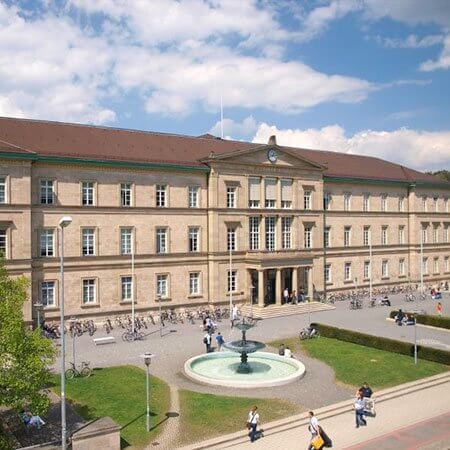Endometriosis is one of the most common diseases in gynecology. Due to this pathology, the tissues of the lining of the uterus appear in other organs and tissues, and they can also grow into the muscular layer of the uterus. Endometriosis foci can also be found in the ovaries, forming cavities filled with fluid (cysts). You can undergo your treatment for this disease at one of the German hospitals. The specialists from the Booking Health company will take care of all the arrangements for your treatment in Germany at the best price.
Content
- Indications for surgery
- Why is it important to choose a good surgeon?
- Diagnostics before surgery
- Surgical treatment options for endometriosis
- Why to undergo your treatment in Germany?
Indications for surgery
Not all women with endometrioid ovarian cysts require treatment. Indications for surgery are the following:
- the size of the cyst is more than 3 cm;
- ovarian cysts tend to grow;
- pelvic pain;
- contraindications to hormone therapy;
- ineffectiveness of hormone therapy;
- signs of malignancy were found based on ultrasound scans or tumor marker laboratory tests.
Why is it important to choose a good surgeon?
Operations for endometrioid ovarian cysts are more complex than for other benign ovarian neoplasms. It is important to choose a good hospital and a good surgeon if you want to get long-term results, avoid complications, and preserve your reproductive function.
The peculiarity of endometrioid ovarian cysts is that they fit tightly to the fallopian tubes, pelvic walls, uterus, and rectum. Cysts can therefore grow tightly together with them. Other endometrial foci can often be located nearby, for example, a retrocervical infiltrate, and then the cysts can grow together with them. All endometrial foci must be completely removed during the same operation.
Endometriomas can sometimes be located in the area of large blood vessels that supply the ovary. It is supplied by two arteries, namely the ovarian artery and the ascending branch of the uterine artery. In this case, the operation becomes even more complicated. It is important that the surgeon does not damage these blood vessels and does not provoke bleeding. On the other hand, excessive coagulation, which destroys ovarian tissue, must be avoided.
Principles of surgical treatment:
- the operation should be performed only once, with no further interventions;
- if the surgical procedure is performed as part of the fight against infertility, it should be planned as close as possible to the period of pregnancy planning;
- cysts can be removed using the least invasive techniques to avoid damaging ovarian tissue or reducing egg supply;
- doctors use hemostatic matrices instead of bipolar coagulation or other energies to stop bleeding so as not to cauterize healthy ovarian tissue;
- if there are other endometrial tissue growths in the pelvic organs, they will be removed simultaneously during the same operation.
Diagnostics before surgery
Diagnostics are important for planning the operation. In addition to clinical examinations (including a mirror examination of the cervix and a bimanual examination through the vagina or rectum), diagnostics involve medical imaging of the ovaries, usually with ultrasound scans. Doctors can also use an MRI if there is insufficient data or questionable results.
German hospitals use the very latest types of ultrasound, including 3D, 4D, duplex and triplex scanning, color flow mapping, etc. The main task of diagnostics is to distinguish an endometrioid cyst from cancer. Doctors look for 5 B signs of benignity and 5 M signs of malignancy. The results are assessed according to IOTA criteria. If there is a risk of malignancy, this is a reason for referring a woman to a consultation with a gynecologic oncologist.
As a rule, endometrioid ovarian cysts have obvious signs of benignity. They are single-chamber, have ground glass echogenicity, and there is no dense component in these neoplasms at all.
Surgical treatment options for endometriosis
The following methods can be used for the treatment of endometrioid ovarian cysts in Germany:
- cystectomy that involves cyst enucleation;
- ablation of the cyst capsule with a laser or cold plasma;
- electrocoagulation;
- sclerotherapy;
- resection (partial removal) of the ovary;
- adnexectomy (removal of the ovary with the fallopian tube) or oophorectomy (removal of only the ovary).
Cystectomy is the most common treatment option. This operation can be done openly or through a laparoscopic approach. Surgeons in Germany almost always use laparoscopy. The operation is performed through short abdominal incisions with thin, long instruments under the guidance of a tiny video camera. Patients recover faster and suffer fewer complications after such interventions. And what is more, this type of surgery does not leave any large scars on the abdomen.
The surgical procedure is performed through three laparoscopic ports. The first one is used to fix the ovary, the second one serves to fix the capsule, and the third one is to separate the cyst from the ovary.
The operation begins with a revision of the abdominal cavity. If there are any ascites (fluid in the abdominal cavity) or suspicious masses, a biopsy will be performed. In standard cases, however, the endometrioma looks like a benign neoplasm, so a biopsy is not required.
Initially, doctors must separate the endometrioma from the side wall of the pelvis. It is usually tightly fixed to it. When separated, the cyst often ruptures and empties.
The ovary may be fixed to the ureter. In this case, doctors separate it from the infiltrate and do it very carefully to avoid any damage to the organ.
Surgeons then proceed to remove the cyst. It is enucleated in a blunt way (stripping technique). The cyst is turned inside out, if possible, and then separated, while healthy ovarian tissue is preserved. Doctors use rigid clamps that provide a firm grip on tissue but do not apply pressure to a large area of a healthy ovary. Experienced surgeons enucleate the cyst carefully without using excessive force to avoid rupture of the ovary and bleeding. The less blood is released, the better, since vascular coagulation is a factor that damages healthy tissue and diminishes ovarian reserve. It is important to clearly define the boundary between the cyst and the rest of the ovary, then blood loss will be minimal.
In most cases, there is no need to suture the ovary after the cyst has been removed. However, if doctors have to deal with a very large endometrioma, the ovary will be sutured after its enucleation. German doctors apply sutures in such a way that they remain inside the ovary. Such an approach protects against the formation of adhesions in the pelvic cavity.
Ablation is not a common treatment method for cysts. It is carried out using lasers or other energies. Doctors at German hospitals prefer this treatment option in cases where the cyst is very tightly attached to the ovary. Attempts to separate it can result in significant trauma to healthy tissue. The surgeon will then remove only a fragment of the cyst and send the material to the laboratory for a histological examination. The remaining part of the cyst will be destroyed.
After removing the cyst capsule in any way, the bleeding must be stopped. Physicians may use different techniques, such as hemostatic sutures, membranes, or bipolar coagulation. Whenever possible, doctors try to avoid coagulation so as not to cauterize healthy ovarian tissue and not cause diminished ovarian reserve.
Combined technique of surgical treatment includes enucleation and ablation. This method can be used for large cysts (larger than 8 cm), the threat of bleeding, and revision surgery for recurrent cysts. The essence of this technique is that a doctor will enucleate the part of the cyst that can be safely removed. The remaining tissues will be burned by laser, cold plasma, or electrocoagulation.
At the end of the operation, German doctors place anti-adhesive barriers to prevent the formation of adhesions in the pelvic and abdominal cavities. Adhesions can disrupt the transport function of the fallopian tube and cause infertility. To prevent them from forming, a polytetrafluoroethylene surgical membrane or hyaluronic acid is injected into the abdominal cavity. They reduce postoperative adhesions and tissue fusion.
Adnexectomy and oophorectomy are rare treatment options that involve the removal of the ovary, sometimes along with the fallopian tube. These procedures can be performed if the cyst is very large, repeatedly develops after its previous removal, or if there is a high risk of a malignant process.
Sclerotherapy (alcohol block) is an alternative treatment option for cysts. It is uncommon due to the high risk of cyst recurrence. The essence of the procedure is that the cyst is punctured with a needle, the liquid is sucked out of it, it is washed several times with saline, and then ethyl alcohol is injected inside. It damages the walls, causes them to stick together, and then fuses them together. Several of these procedures may be required to achieve the final result.
The technique is rarely used as it is indicated for women with a critically low ovarian reserve. After sclerotherapy, a patient can have time to do IVF or get pregnant naturally before the cyst appears again. Sclerotherapy can be a less common option when there is an indication for the removal of the entire ovary to preserve the organ.
Sclerotherapy is most commonly used at German hospitals to remove endometrioid ovarian cysts before IVF in a quick and non-traumatic manner while preserving the woman's ovarian reserve. The pregnancy rate with IVF after sclerotherapy of ovarian endometriomas reaches 57%.
Why to undergo your treatment in Germany?
If you have ovarian cysts, you can undergo your diagnostics and treatment of endometrioid ovarian cysts in Germany. In this country, you will find state-of-the-art Gynecology Centers, reputable doctors, and the latest techniques for performing operations. There are a few reasons for you to undergo your treatment in Germany. These are the following:
- accurate diagnostics will help to exclude malignant processes in the ovary;
- almost all operations are performed using minimally invasive laparoscopic techniques;
- sparing cyst removal with complete preservation of healthy ovarian tissue;
- maintaining a high ovarian reserve after the completion of surgical treatment and having good chances of getting pregnant;
- doctors at German hospitals use hemostatic matrices instead of bipolar coagulation to stop bleeding so as not to damage healthy ovarian tissue;
- surgeons introduce anti-adhesive barriers at the final stage of the operation to avoid the formation of adhesions in the pelvic cavity.
If areas of the lining of the uterus are found not only in the ovaries but also in other sites, they will also be removed to achieve maximum regression of the disease. After the operation, women receive a course of hormonal treatment so that endometriosis foci in the ovaries and other organs do not recur.
You are welcome to use the Booking Health service to find out the cost of treatment and make an appointment for your treatment in Germany at the best price. The Booking Health staff will help you select the most suitable German hospital and arrange your trip. When you make your treatment appointment through Booking Health, prices will be lower than when you contact the hospital directly, due to the absence of taxes for foreign patients.
Authors:
The article was edited by medical experts, board-certified doctors Dr. Nadezhda Ivanisova and Dr. Sergey Pashchenko. For the treatment of the conditions referred to in the article, you must consult a doctor; the information in the article is not intended for self-medication!
Sources:
National Center for Biotechnology
Web MD




















